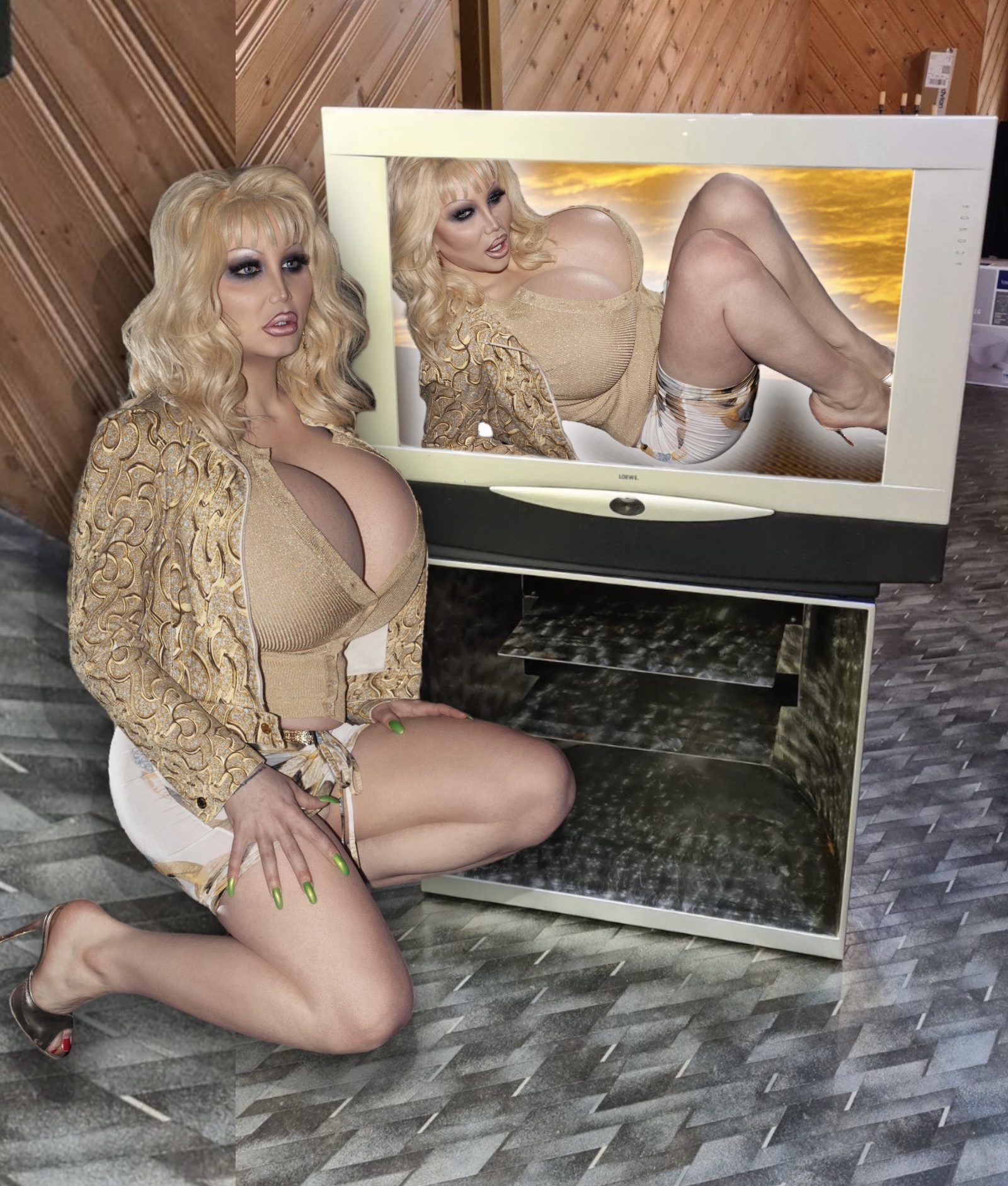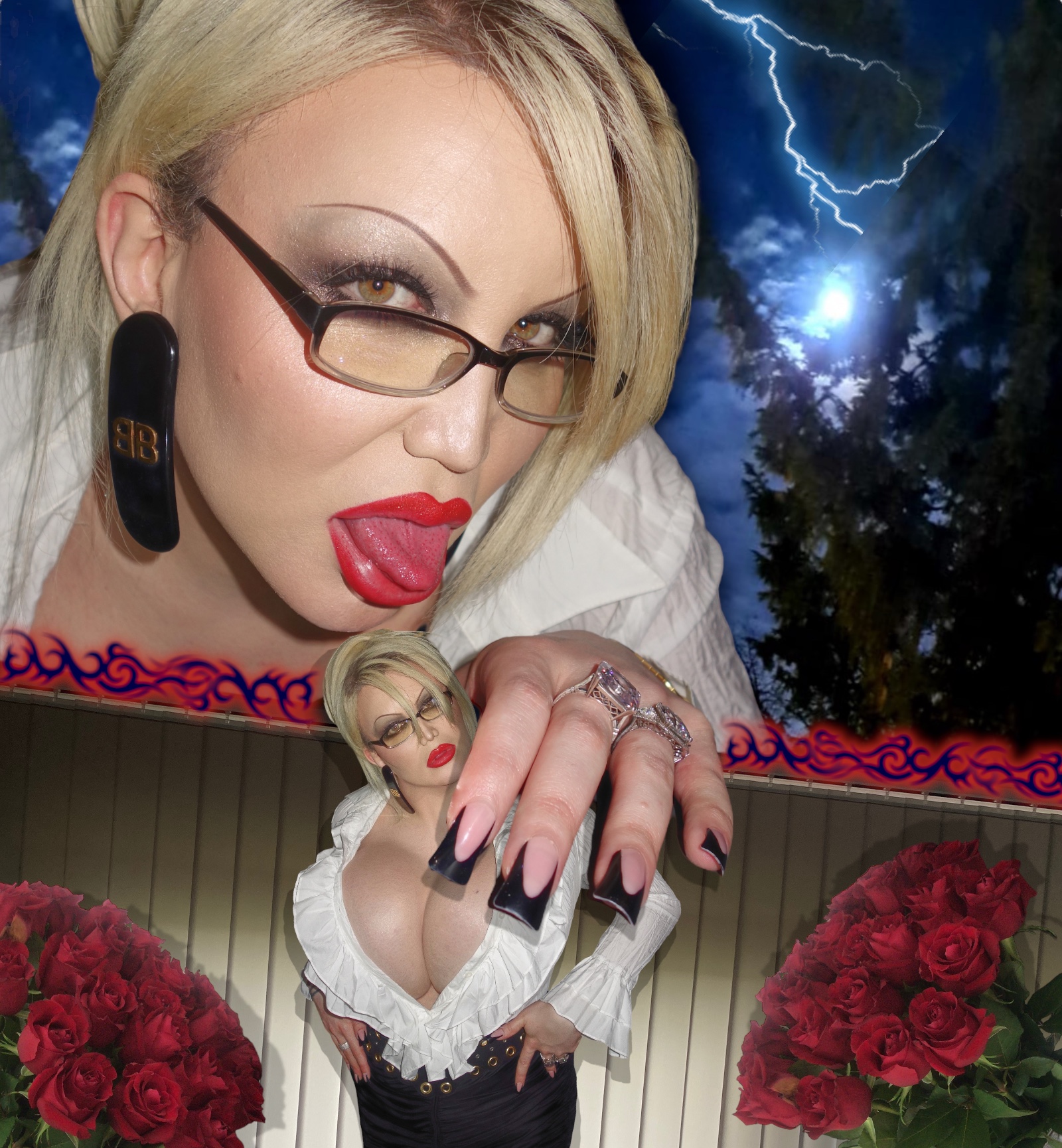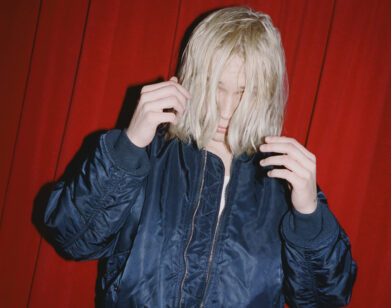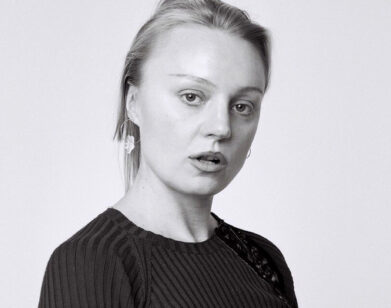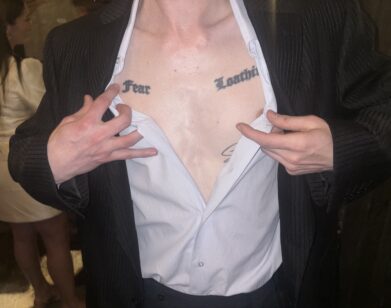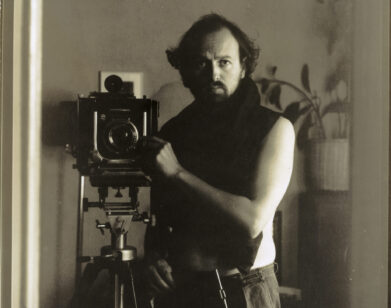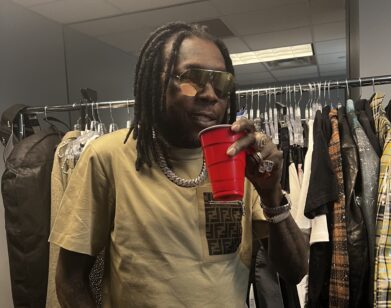MOTHER
“I’m Like a Picasso, Distorted and Expensive”: Ivana Vladislava Gets Freaky With Anna Uddenberg
“I was trying so hard to be pretty that I ended up being completely disfigured—and I think it’s hilarious,” said Ivana Vladislava when she met up with fellow artist Anna Uddenberg at a cafe in Berlin earlier this month. Ms. Vladislava, a beloved mother figure in the city’s queer club scene, likes to find the humor, irony, and absurdity in most things, including her own life. At 14, she left Poland and settled in Berlin. A few facelifts later, Vladislava holds a mysterious and maybe even Oedipal grip over a healthy gaggle of gays and heterosexual lovers, along with her hundreds of thousands of Instagram followers. Because she’s both the artist and muse, Vladislava’s life is “something between an art performance and a social experiment,” she explains. Accordingly, her Instagram is a mosaic of the aesthetic that Vladislava describes as “post-communism wealth,” which is all about “wearing everything you have, if it matches or not.” Before Uddenberg returned to her newborn and Vladislava dipped to “fucked the waiter,” as she quipped, the pair had a mother-off, touching on the art of self-objectification, and what it means to be an It-Girl.—EMMA STOUT
———
ANNA UDDENBERG: You smell so nice, like powder!
IVANA VLADISLAVA: Thank you, it’s an old school perfume called Teint de Neige and it literally smells like a powder puff. I love to smell like a grandma! Speaking of golden girls, how old are you?
UDDENBERG: [Laughs] You don’t ask a lady that! Let’s say I’m forever 33. How old are you?
VLADISLAVA: My age is a medical mystery. I think people who are in their 40s but act like they’re still in their 20s wasted 20 years. How do you feel about getting older?
UDDENBERG: It’s a freaky idea to know that my body is going to decay one day. It’s a strange thing to be in a body.
VLADISLAVA: That’s crazy, but so is the world. Do you think art can change the world?
UDDENBERG: I do, but the world has to make space for art. It’s not a given. Art can change one’s perception of the world.
VLADISLAVA: You know what I always say? “I can’t change the world but I can change my life.” What is your inspiration in art ?
UDDENBERG: I’m not referencing art in my work. Instead, I draw inspiration from everyday ugly stuff. For example, I find influence in the German government and absurd situations that occur within official offices with authorities. These made-up rules—rules for the sake of rules—and the conformity they demand feel so artificial to me. It’s like a very time-consuming game you never signed up for but are forced to play along with.
VLADISLAVA: That’s interesting. I’m taking my inspiration from what I call “post-communism wealth.” It’s a curtain kind of aesthetic that comes from people in eastern Europe who don’t have much but try to make the possessions they have look fancy. It’s the concept of wearing everything you have, if it matches or not.
UDDENBERG: Do you like interviews?
VLADISLAVA: Yes, I love to talk. I think talking is my biggest talent. Do you like interviews?
UDDENBERG: I used to like interviews but then there was a moment where I felt I had no control over the outcome anymore.
VLADISLAVA: What is the worst thing that could possibly happen to you during an interview?
UDDENBERG: When my words get shuffled around and sentences get twisted, when the meaning of my thoughts get simplified or the other way around.
VLADISLAVA: That’s totally relatable. Do you know why a fish gets caught? ‘Cause he opened his mouth. They can only twist your words when you deliver them the material. The best interviews are the old ones with Michael Jackson where he basically said nothing, just smiled and waved to the fans.
UDDENBERG: Right. Do you like Michael Jackson?
VLADISLAVA: Yes, I love good, old-school celebrities. I’m really fascinated by the concept of being the most famous person in the world. It’s like creating this god-like persona over everything and everyone. It’s almost like a cult.
UDDENBERG: True. I’m very curious about this too, the star or icon figure isolated from the world, inaccessible to the rest of us, but I think that this stardom has shifted because of social media. Now it is all about showing your “authentic self.” This sort of “accessibility” requires a casual approach to stardom. Authenticity is sort of the currency that social media runs on.
VLADISLAVA: Yes, but no matter how casual it looks, it still feels staged.
UDDENBERG: It’s a format that changes all the time depending on the context. For example, we now know that reality TV shows are heavily scripted, edited, and “staged,” but when this phenomenon was new, it all felt very “real.” I find this performed, self-conscious idea of the “authentic self” super interesting when it’s convincing. And for whom is this performance taking place, anyway? For example, I’ve always been curious about the idea of “it-girls”.” What is “it”?
VLADISLAVA: Did you find out?
UDDENBERG: No, but I found you. My graduation show in art school was actually titled Looking For It. When I researched what an It-Girl is and where the origins of this concept come from, I discovered it started in the 1920s in Hollywood. Essentially, it means being effortlessly cool and sexy—it’s all about appearing casual and making it look easy.
VLADISLAVA: A naturally mesmerizing person.
UDDENBERG: Exactly.
VLADISLAVA: I think that “it-girls” were always present. I think the first ever It-Girl was Cleopatra. The concept of a woman being effortlessly fabulous and setting trends is something we can find through history over and over again, like Marie Antoinette, Madame de Pompadour, Princess Sissi. Even in Japan, Geishas and Oiran could be described in modern words as the “it-girls” of their time. However, there is also something tragic to an It-Girl because so many of them had their downfalls, starting with Marie Antoinette, who lost her head, then the It-Girl, Joan Crawford. Her dirty laundry was spread out very publicly. Anyone who saw Mommy Dearest will know. Also, Marilyn Monroe had a tragic end. Even modern “it-girls” like Lindsay [Lohan], we all watched them fall. Does it always end with a tragedy?
UDDENBERG: There is something destructive about “it” and I think the destruction of the image is part of the “it.” Something has to be admired and then it has to be broken, moments like Britney [Spears] smashing the car with an umbrella are sort of the peak moment of “it,” where everything explodes in everybody’s faces.
VLADISLAVA: Yes! That’s the “it.” It’s a system: we build up the It-Girl, we glorify her, and then we destroy her. It’s actually very poetic since humans are very self-destructive by nature, so somehow It-Girls are a manifestation of human nature.
UDDENBERG: It’s fascinating.
VLADISLAVA: You know, I grew up in a very Catholic environment and the first ever sort of celebrity I was introduced to was Jesus. He was everywhere! Hanging on the walls all over the village I grew up in, and there is somehow a connection to modern-day stardom. The power of faith and the power of fame are very powerful. Anyway, maybe I’m wrong, but I have a feeling you are obsessed with butts.
UDDENBERG: I love them. You’re right!
VLADISLAVA: Is it a fetish?
UDDENBERG: I guess, yeah.
VLADISLAVA: Do you like my butt?
UDDENBERG: Of course.
VLADISLAVA: It’s not art, but it’s artificial for sure.
UDDENBERG: I read an interview where you mentioned that you turn yourself into a living art work, in a sense of living as an art object.
VLADISLAVA: Yes, it’s something between an art performance and a social experiment. Living as an artist can also mean that I am my own artwork. I developed this idea because of rejection. I was excluded, I was declined, and I was not invited. All I heard was, “No! No! No! You’re not good enough! You’re ugly! You’re old! You’re a freak! You’re trash! You’re botched!” And so on. Then I decided to twist the coin and take all these negative things and perceptions about me, turn them to my advantage and take them to an extreme. I find beauty in the grotesque and I love to confuse society.
UDDENBERG: Gorgeous. Another art school project I did involved objectifying myself because I wanted to break free from the narrative of being “myself.” The concept of identity felt a bit claustrophobic to me, so I tried to liberate myself from it by turning myself into an object or a software of some kind.
VLADISLAVA: I think self-objectification is something we all do at some point because being an object means having no feelings, which leads to being emotionally invincible. It’s the ultimate form of perfection, because perfection is artificial. Like a doll.
UDDENBERG: Would you turn yourself into a doll?
VLADISLAVA: Yeah, why not? I already look like Chucky’s bride. But honestly, I’m not afraid of imperfections. I was trying so hard to be pretty that I ended up completely disfigured. And I think it’s hilarious, ‘cause it’s so tragic, yet ironic. It led me to a point where I have nothing left to lose. I had the choice between being miserable or making the best out of it. Society constantly tried to limit me. When I said, “I’m gonna be a model,” everybody laughed, and then my face was plastered in global fashion campaigns and I walked runways in Paris and Milan. I used the stones the world put in my way to build myself a castle. The fashion industry gave me a platform to shine and trust me. And the fashion industry is tough—it’s the Wild West. There are rules and laws behind the scenes. It’s a brutal industry. People want to work in fashion, but they fail because they can’t withstand it. I don’t care. I’m not afraid to fall and fail. I enjoy every moment of it, and I think that’s the key to success.
UDDENBERG: I love this.
VLADISLAVA: What do you think about the fashion industry?
UDDENBERG: I don’t! [Laughs]
VLADISLAVA: The fashion industry is like sitting in a bathtub filled with extremely hot water. If you stay still long enough, it will eventually become pleasant. It’s like a frog sitting in the pot, being cooked slowly. What do you think about plastic surgery? Would you ever consider getting something done?
UDDENBERG: Absolutely! I would love to have a ponytail face lift. But I might chicken out in the end. I’m too scared.
VLADISLAVA: I had so many facelifts. My face is so tight. When I bend over, my mouth snaps open on its own like a cat flap.
UDDENBERG: You look great.
VLADISLAVA: I’m like a Picasso, distorted and expensive. Speaking of Picasso, do you sell your art?
UDDENBERG: Yes, I work with three galleries: KTZ in Berlin, Meredith Rosen Gallery in New York, and House of Gaga in Mexico.
VLADISLAVA: What kind of person buys your art?
UDDENBERG: Alexander Petalas, for example, he collects a my work. He also runs an exhibition space called The Perimeter, where I did a show last year. He is an amazing person.
VLADISLAVA: Do you think a British Royal would buy your premium economy sculpture? I can imagine it standing in Buckingham Palace and Queen Camilla climbing in it to get Charles in the mood.
UDDENBERG: Only if you become my art dealer. You could make it happen.
VLADISLAVA: Is art always serious? Or can art be funny?
UDDENBERG: I think art that tries to be funny doesn’t really succeed, but there is sometimes a moment where art has this sort of absurd quality, which can be funny. Art jokes are not funny, but there are some works that are quite serious but might have absurd twists that can be funny.
VLADISLAVA: My art is very sarcastic. I like to troll people or confuse them. I’m never serious about it, because my whole life is so stupid. At some point, I have to laugh a lot about myself, and I love to add irony to my work. My latest project, for example, was my leopard kitchen. It went viral. 54 million people hated it. Do you have new projects coming?
UDDENBERG: My projects are very far in the horizon, but I have a show next year in New York.
VLADISLAVA: Are you afraid of being bored?
UDDENBERG: Yes.
VLADISLAVA: I once dated an investment banker and he told me that he always considers investing in at least one thing he would never imagine investing in, otherwise he gets bored. But since you are a freshly-made mother, I’m sure it will never get boring again. By the way, congratulations on your baby. How does it feel being a mom?
UDDENBERG: It’s amazing. I’m so hormonal, it’s like being constantly high, high on mother love!
VLADISLAVA: I’m not a mother but the gays and some of my lovers call me “mommy.” Anna, my last question before you can leave and I can fuck the waiter: is there any good advice you could give to new artists?
UDDENBERG: No. But there is a famous saying I like: “Don’t complain and don’t explain.”
VLADISLAVA: Express yourself, never explain yourself.

